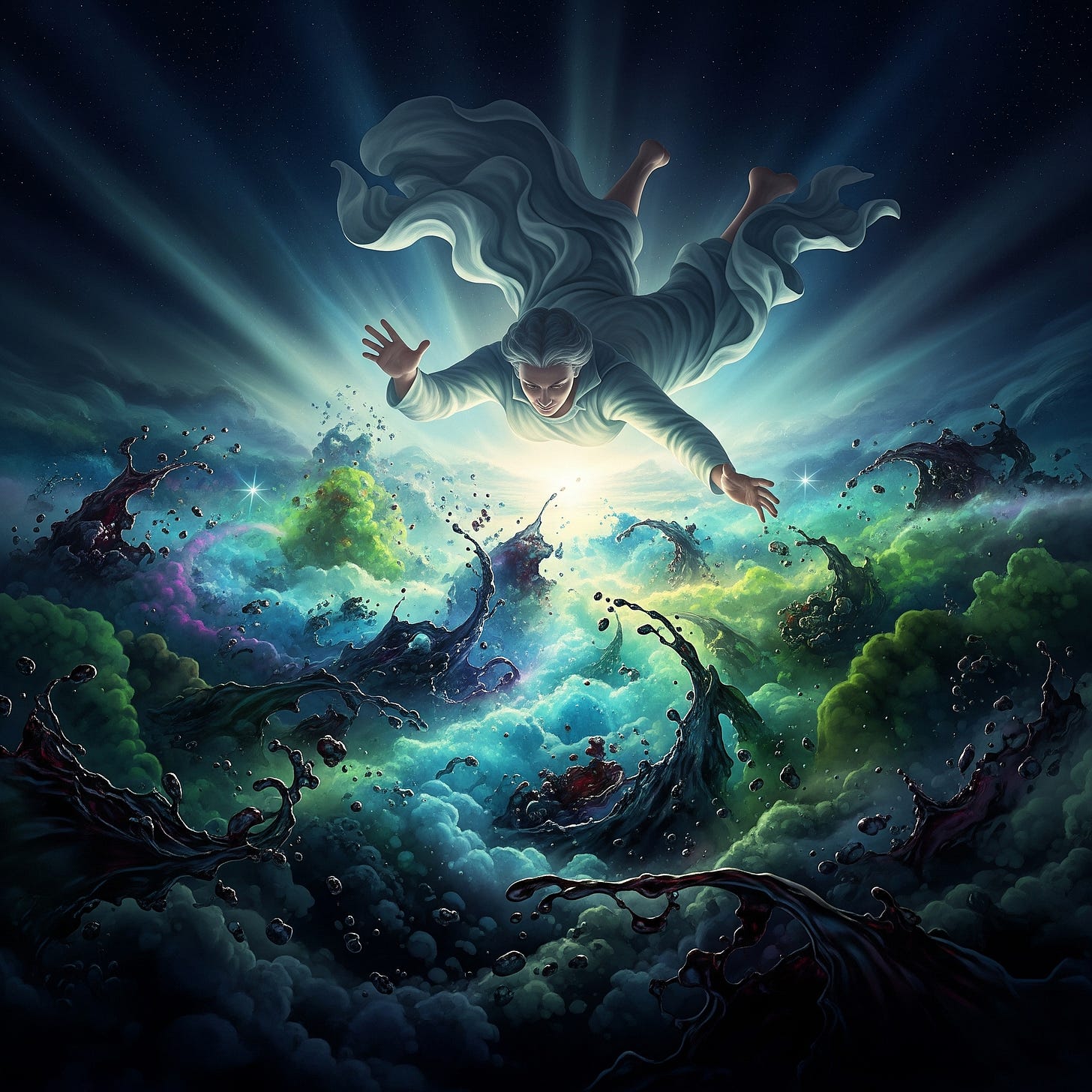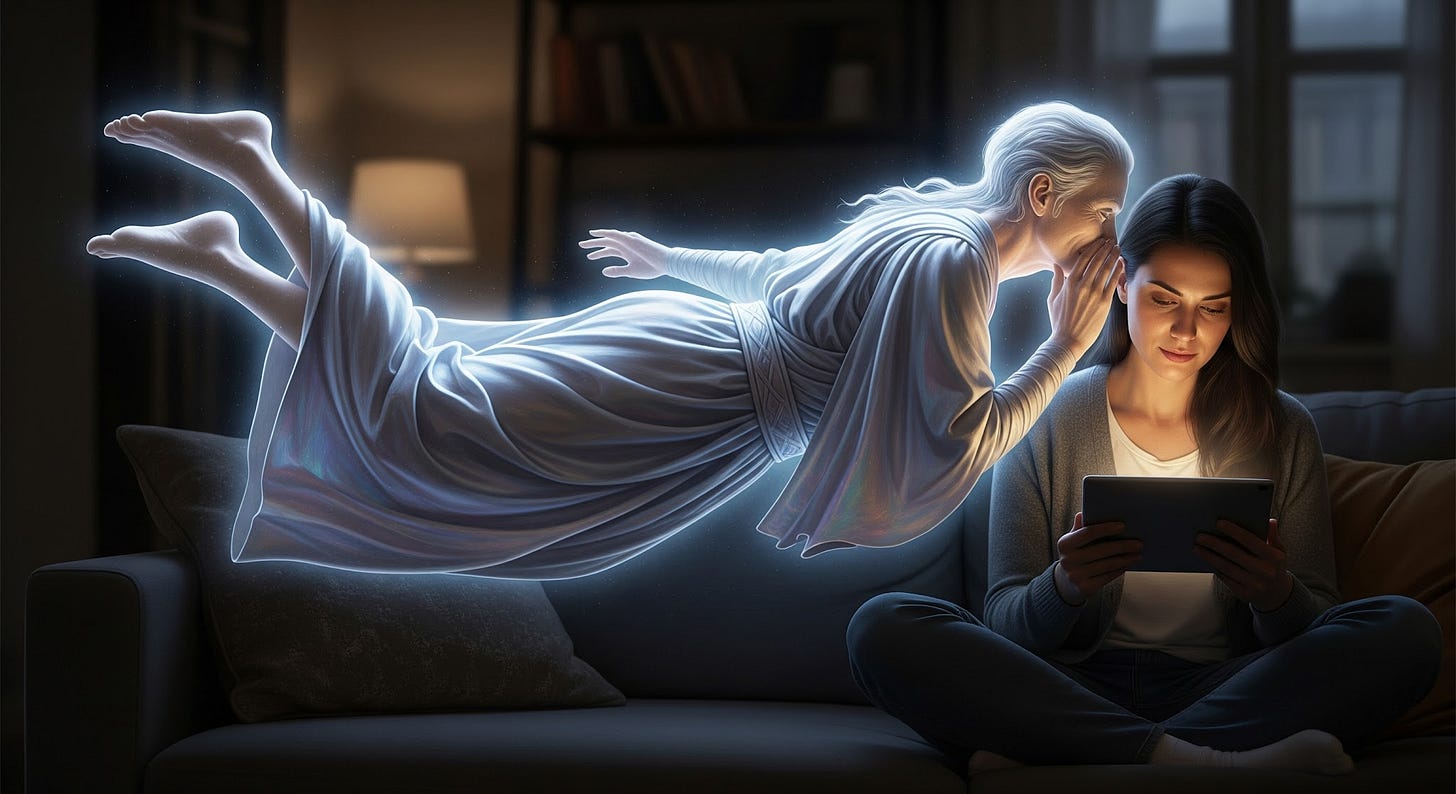Theory #5 Has issues—Part 4: The Downsides of a Morally Perfect God
The consequences of God’s being uncontrolling and noncoercive
This post is part 9 of a series1 titled Why Consider an Evolving God?
The last two posts have presented analogies or parables which, I think, highlight and suggest moral problems with the concept of a God who is uncontrolling yet willing to co-create beings capable of enduring and causing suffering.
Parable 1—A Caring Executive, showed that the executive in question, Elouise, in being unable to bring herself to control her managers to prevent them from implementing a risky decision, bore partial responsibility for the disastrous results.
Parable 2—Parents Pondering Procreation, showed how Augustin and Fredeline’s decisions to have children in chaotic, violence-torn Haiti, while loving, doomed their children to violence-torn lives full of terrible suffering and temptations to engage in violence themselves.
Parable 3 about Ryan and his a-bit-too-creative AI, Eden, showed that creating or co-creating a conscious being with agency makes one co-responsible for that being’s moral failures.
All three parables suggest that if God is uncontrolling yet audacious enough to risk co-creating conscious beings in circumstances that will very likely lead to terrible suffering for some and the committing of grave evils by others, then that God bears partial responsibility for the suffering and the evils, and thus cannot be considered morally perfect.
Is there some way of visualizing God and creation in a way that preserves Sh-his absolute moral perfection? And is moral perfection really something we should want God to possess?
Did God co-create consciousness?
If God is uncontrolling and strictly noncoercive, then God can co-create by drawing and inviting what already exists to participate in its further development and improvement. But God cannot create singlehandedly from scratch. Creating singlehandedly requires at least control and perhaps coercion. How so? To create something, whether inert or capable of experiencing, means controlling reality so that it contains something it did not contain a moment before. To create something conscious from scratch, you have to bring it into existence before you can ask it whether it wishes to exist. You cannot get its consent first. You make something happen to it without its consent. That’s coercion, plain and simple.
If the coercion part seems dubious, then consider this brief parable:
Imagine a little boy-God. This Godlet doesn’t have the power to create a whole universe from scratch, but can create a small, self-contained environment populated by a single fully conscious human being. The boy-God lacks the power to make the little environment a paradise. Instead, it’s like a pinched-off portion of hell, and the newly created human starts suffering right away. She endures torment for about 10 minutes then finally dies a tortuous death, writhing in agony. Finally the little bubble universe pops out of existence.
Was our boy-God coercive in creating the hapless woman? She did not ask to be created. She did not want to have been created as she began suffering horribly. And she is lucky, many would say, to have died, even though the process was excruciating. She didn’t choose any of that. She was definitely coerced.
It’s clear then that if God is neither controlling nor coercive, Sh-he cannot create either inert or experiencing things from scratch. Let’s put it another way, in the context of time. There never was or will be a time when an uncontrolling, noncoercive God will have created or ever will create anything from scratch. Such a God could, however, co-create by drawing and inviting what already exists toward a new, hopefully improved state as time flows. God co-creates in cooperation with the entity or process God is drawing or inviting. But since God is noncoercive, the entity or process in question makes the final decision as to how its evolution is to proceed. God can influence the direction of change but not enforce it.
Some process theologians say things like “There is no entity that predates God. God always creates out of what previously existed.” And some open and relational theologians say things like, “God has always been creating out of what has previously been created.” In both cases, when the theologian saying that believes God neither controls nor coerces, then “create” should be understood as “co-create.” And as I said above, there never was a time, no matter how far back you go, in which that kind of God could create from scratch.
Thus, go way back, even to eternity past,2 and something always existed alongside God.
This means that God, if uncontrolling and noncoercive, is not the author of all creation. Something primordial, perhaps a seething chaos, existed alongside God. And out of this chaos God, if God is good, tries to draw something ordered and valuable through invitation, persuasion, and inspiration. Now it may be that, between eternity past and the present moment, God has been able to influence every part of that existing-on-its-own primordial soup, so everything that exists now has been co-created by God. But it could not have been so “in the beginning” for an uncontrolling, noncoercive God.
Notice too that the primordial soup must have been composed of elements that were panexperiential.3 If God’s co-creative approach was and is to have any possibility of working, what God hopes to draw and invite must be capable of making choices, however simple. But entities (or actual occasions) can be panexperiential and not conscious. When consciousness enters the picture, as our parables showed in this and the previous few posts, things get morally sticky.
If God is uncontrolling and noncoercive, and thus creates nothing from scratch, it is possible for God to be absolutely morally good. Every single choice God made could have been to improve the state of what God was hoping to influence and invite. If the primordial soup originally contained conscious processes, then God could ever be trying to draw those processes to better and more loving states. It may be that those processes draw other, unconscious processes into consciousness, and then God would try to draw those processes toward ever more love. In this situation, God could be utterly good.
But if the primordial soup was made up of only nonconscious elements, and God drew and invited some of them into consciousness, then, as in our boy-God parable, God has co-created consciousness and bears some of the responsibility for the evils and sufferings that these conscious processes and their descendants have carried out and endured.
In that case, God cannot always have been morally perfect. And if God is drawing nonconscious processes to consciousness still today, then God may be fabulous and loving but nonetheless willing to entice those processes—which can have no idea what they’re getting into—to a conscious state in which they will likely suffer and commit evils. And thus God is still not morally perfect today.
If God is morally perfect, then we’re in trouble
In the rest of this post, we’ll unpack some consequences of living in a reality influenced by an uncontrolling, noncoercive, morally perfect God who does not—cannot—create or co-create consciousness. Future posts will consider morally imperfect God concepts. Those posts will try to show why that is the type of God we might want to hope for.
The first problem we face if our God is morally perfect is that it means God did not create consciousness and never creates conscious beings. So God is not my creator and Sh-he is not your creator. We owe our consciousness to the primordial soup, not to God. God has improved consciousness by drawing it to better states, and so we’ve been co-created by God and we’ve been improved by God. But some people badly want to have been created by God, to be able to call God their Creator. If we have a morally perfect God, then God is not our creator but merely our co-creator. And even as co-creator, God did not participate in making us conscious, only in trying to improve our consciousness once we possessed it.
But that’s not all. There’s another problem, and it’s a daunting one to contemplate. It’s possible that God did not always exist but rather sprang into existence at some point long ago but not infinitely long ago. We will give that idea serious consideration in future posts. In this post, we are going to consider God as morally perfect and everlasting in both directions (past and future). And the primordial soup as also everlasting.
Given that, it’s been a good while since God started drawing the primordial soup toward better states. In fact, it’s been forever. And after all this endless inviting and drawing and persuading, all God has helped bring us to is the reality we now experience. For some of us, this reality is pretty decent, though we do lose loved ones all through our lives and are forced to give up our own physical selves at the end of our lives. But for others, it is far less pleasant, as previous posts have noted (e.g. mothers choking on Zyklon-B gas while watching their children get gassed in Nazi death camps). Some of us lead morally decent lives, but others commit horrendous crimes and offenses and cause vast mayhem and suffering. The whole method of evolving new physical beings as earlier ones die off employs some very painful processes—predation, parasitism, entropic withering and decay. Again, I have dwelt on these things in earlier posts and won’t belabor them now.
It has taken forever to get only this good. And we are a long, long way from where most of us wish we could be. How long is it going to take for God to draw reality to something heaven-like, something we would really long to inhabit? If the past is any indication, it is going to take, if not another eternity, at least a very, very long time.
That is a consequence of our having a morally perfect God. God cannot control. God cannot coerce. God cannot make things get really good really quickly. God is going to work really hard and it is still going to take ages.
But what about this? Maybe things were really, really good for almost all of the time leading up to now, and we are just in a brief period during which things have temporarily gone radically south.
There are at least two problems with this idea. First, science has shown that this “brief” downturn has lasted at least 13.8 billion years. So, not forever, just tens of billions of years. Whew!
Second, if things can be sailing along really great and then a terrible fall happens because, presumably, God can’t use control and coercion to keep rowdy conscious beings or processes from using their free wills to drag God’s whole community way off course and founder it on shoals and rocks, then what’s to say terrible falls haven’t happened again and again throughout eternity past, and won’t keep happening time after time in the vast ages to come?
So the consequence of God’s being morally perfect, given what we know about reality now and how we experience it, is this: ages more before we can enjoy a heaven-like state, and then the likelihood of that falling apart time and again in yet more distant ages with difficult climbs back up every time. That is the future we have to look forward to if God is morally perfect.
Is that really what any of us want? Maybe God’s not being so perfect, or at least not always having been so perfect, might help us envision some better alternatives. We’ll consider them a few posts from now, but lest anyone despair, there are a couple of afterlife scenarios we’ll consider in the next post that give palpable hope of glorious resurrections that begin the very next moment, in subjective time, after we die, and yet still let God be morally perfect.
Until then, pay close attention to God’s subtle nudges and appeals. You never know what God will come up with for you to try next!
If you’d like to read more about divine hiddenness and God’s evolution, my book, The Silence of the Lamb: Exploring the Hiddenness of Christ and God is available in paperback and Kindle versions.
Here’s Tom Oord’s shORTs episode describing the book in a three minute podcast: Ep. 276: Exploring Divine Hiddenness.
Here is a list of the previous posts in my Why Consider an Evolving God? series:
“Eternity past” is of course a meaningless concept because there is no time when eternity past existed, but it gets the point across.
“Panexperiential” means not necessarily conscious but able to make at least rudimentary developmental choices.













Watch this video if you can and let me know what you think. This is what I believe and hope for will happen. I know it does not answer all the questions, but it makes sense.
https://open.substack.com/pub/bradleyjersak124315/p/maximus-and-the-freed-will-bradley?r=1ny9fu&utm_campaign=post&utm_medium=web&showWelcomeOnShare=false
I love reading these. Its like brain candy, i think you bring up some very good questions. I hope one day we will have the answers to.